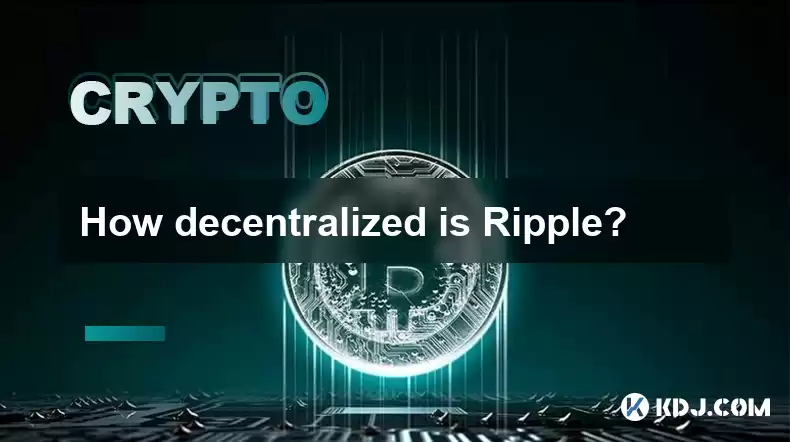-
 Bitcoin
Bitcoin $118800
-0.43% -
 Ethereum
Ethereum $4231
-0.53% -
 XRP
XRP $3.140
-1.41% -
 Tether USDt
Tether USDt $1.000
-0.02% -
 BNB
BNB $808.5
0.57% -
 Solana
Solana $175.1
-4.38% -
 USDC
USDC $0.9999
0.01% -
 Dogecoin
Dogecoin $0.2229
-4.71% -
 TRON
TRON $0.3458
2.18% -
 Cardano
Cardano $0.7744
-3.43% -
 Hyperliquid
Hyperliquid $43.19
-4.44% -
 Chainlink
Chainlink $21.19
-4.12% -
 Stellar
Stellar $0.4313
-2.84% -
 Sui
Sui $3.659
-5.59% -
 Bitcoin Cash
Bitcoin Cash $580.1
1.65% -
 Hedera
Hedera $0.2472
-4.61% -
 Ethena USDe
Ethena USDe $1.001
-0.03% -
 Avalanche
Avalanche $22.88
-3.98% -
 Litecoin
Litecoin $120.5
-2.63% -
 Toncoin
Toncoin $3.375
0.74% -
 UNUS SED LEO
UNUS SED LEO $8.984
-1.31% -
 Shiba Inu
Shiba Inu $0.00001296
-4.28% -
 Uniswap
Uniswap $11.06
1.08% -
 Polkadot
Polkadot $3.869
-4.65% -
 Cronos
Cronos $0.1664
1.09% -
 Dai
Dai $1.000
0.00% -
 Ethena
Ethena $0.7979
0.07% -
 Bitget Token
Bitget Token $4.395
-1.14% -
 Monero
Monero $268.2
-0.19% -
 Pepe
Pepe $0.00001125
-6.91%
How decentralized is Ripple?
Ripple's decentralization is debated; while XRP Ledger is open-source and distributed, Ripple Labs' significant control over development, governance, and XRP holdings raises concerns about centralization and potential manipulation.
Mar 11, 2025 at 11:10 pm

Key Points:
- Ripple's decentralization is a complex issue with no simple answer. It operates on a distributed ledger, but key aspects of its control and governance are centralized.
- While XRP Ledger (XRPL) is open-source and permissionless, Ripple Labs holds significant influence over its development and ecosystem.
- The concentration of XRP ownership raises concerns about potential manipulation and centralization of power.
- The degree of decentralization is a matter of ongoing debate within the cryptocurrency community.
How Decentralized is Ripple? A Deep Dive into XRP and its Network
The question of Ripple's decentralization is a contentious one within the cryptocurrency community. While often touted as a blockchain technology, the reality is far more nuanced. Understanding Ripple's level of decentralization requires examining several key aspects: its underlying technology, its governance structure, and the distribution of its native cryptocurrency, XRP.
The XRP Ledger (XRPL), the underlying technology of Ripple, is a distributed ledger. This means transaction records are replicated across numerous servers, theoretically making it resistant to single points of failure. The open-source nature of the XRPL allows for community contributions and scrutiny of its code. However, this openness doesn't automatically equate to decentralization.
Ripple Labs, the company behind XRP and the XRPL, plays a significant role in the network's development and maintenance. They contribute heavily to the codebase, influence consensus mechanisms, and maintain a considerable infrastructure supporting the network. This centralized influence is a major point of contention for those questioning Ripple's decentralized claims.
The governance structure of the XRPL also contributes to the ongoing debate. While the network is permissionless, meaning anyone can participate, Ripple Labs' influence over development and ecosystem initiatives casts a long shadow. This concentration of power raises concerns about potential censorship or manipulation of the network.
The distribution of XRP further complicates the picture. A substantial portion of XRP is held by Ripple Labs, leading to concerns about potential market manipulation. This concentrated ownership contrasts sharply with the decentralized ethos of many cryptocurrencies where token distribution is more widely dispersed.
The validation process within the XRPL also deserves attention. While validators are technically not controlled by Ripple Labs directly, their selection and operational practices are indirectly influenced by the company's actions and initiatives. This influence on the network's core validation mechanism raises concerns regarding the independence and decentralization of the network.
The development of the XRPL is primarily driven by Ripple Labs, despite the open-source nature of the code. This centralized control over development can affect the network's future direction, potentially leading to changes that may not reflect the wishes of the wider community. The community's influence, while present, is significantly overshadowed by Ripple Labs' power.
The consensus mechanism used by the XRPL is a unique aspect that impacts its decentralization. While it is a distributed consensus, Ripple Labs’ influence over infrastructure and validators makes it less purely decentralized compared to systems like Proof-of-Work or even some Proof-of-Stake networks.
The legal and regulatory battles surrounding Ripple have further highlighted the company's central role in the XRP ecosystem. The ongoing litigation underscores the intertwined nature of Ripple Labs and the XRPL, further fueling the debate about its true level of decentralization.
The concept of decentralization itself is multifaceted. A fully decentralized system would ideally lack any single entity with significant control over its operation. Ripple, with its centralized development, significant XRP holdings, and influence over the network's infrastructure, clearly falls short of this ideal.
The economic model surrounding XRP and its adoption also plays a role in determining the network's decentralization. Ripple Labs' active promotion of XRP for payments further cements its influence over the cryptocurrency's trajectory and the XRPL's overall health.
The open-source nature of the XRPL allows for community audits and modifications, but the significant influence of Ripple Labs remains a critical factor affecting the network's level of decentralization. The potential for community-led improvements exists, but Ripple Labs' power significantly shapes the network's development.
The future of Ripple's decentralization is uncertain. Increased community participation and a more distributed ownership of XRP could theoretically lead to a more decentralized future. However, the current power structure favors a centralized model.
Frequently Asked Questions:
Q: Is XRP a decentralized cryptocurrency?
A: XRP operates on a distributed ledger, but Ripple Labs exerts significant control over its development, governance, and a large portion of its supply. This makes its decentralization a matter of ongoing debate.
Q: How does Ripple's centralization affect XRP's value?
A: The centralized nature of Ripple can affect XRP's value negatively by making it more susceptible to manipulation and potentially less attractive to investors seeking truly decentralized assets.
Q: Can Ripple's decentralization improve over time?
A: Theoretically, yes. Increased community involvement, more distributed XRP ownership, and a shift in governance could lead to greater decentralization, but it’s not guaranteed.
Q: What are the implications of Ripple's centralization for its regulatory compliance?
A: Ripple's centralized structure has made it a target for regulatory scrutiny, as regulators may be more concerned about the potential for manipulation and lack of transparency compared to truly decentralized networks.
Disclaimer:info@kdj.com
The information provided is not trading advice. kdj.com does not assume any responsibility for any investments made based on the information provided in this article. Cryptocurrencies are highly volatile and it is highly recommended that you invest with caution after thorough research!
If you believe that the content used on this website infringes your copyright, please contact us immediately (info@kdj.com) and we will delete it promptly.
- Dogecoin's Wild Ride: Big Holders, Price Push, and What's Next for the Meme Coin
- 2025-08-12 08:30:12
- Bitcoin to $133,000? Here's What the Experts Are Saying
- 2025-08-12 08:30:12
- Dogecoin, Meme Coins, and Whale Buys: What's the Hype?
- 2025-08-12 06:50:12
- Bitcoin, Ethereum, and the Pump-and-Dump Merry-Go-Round: A New Yorker's Take
- 2025-08-12 07:10:12
- MAGACOIN Mania: Why Holders Are Staking Their Claim in This Bull Season
- 2025-08-12 06:30:13
- Heritage Distilling's Bold Bet: A $360M IP Treasury Powered by Story Protocol
- 2025-08-12 06:30:13
Related knowledge

How to purchase Aragon (ANT)?
Aug 09,2025 at 11:56pm
Understanding Aragon (ANT) and Its PurposeAragon (ANT) is a decentralized governance token that powers the Aragon Network, a platform built on the Eth...

Where to trade Band Protocol (BAND)?
Aug 10,2025 at 11:36pm
Understanding the Role of Private Keys in Cryptocurrency WalletsIn the world of cryptocurrency, a private key is one of the most critical components o...

What is the most secure way to buy Ocean Protocol (OCEAN)?
Aug 10,2025 at 01:01pm
Understanding Ocean Protocol (OCEAN) and Its EcosystemOcean Protocol (OCEAN) is a decentralized data exchange platform built on blockchain technology,...

Where can I buy UMA (UMA)?
Aug 07,2025 at 06:42pm
Understanding UMA and Its Role in Decentralized FinanceUMA (Universal Market Access) is an Ethereum-based decentralized finance (DeFi) protocol design...

How to buy Storj (STORJ) tokens?
Aug 09,2025 at 07:28am
Understanding Storj (STORJ) and Its Role in Decentralized StorageStorj is a decentralized cloud storage platform that leverages blockchain technology ...

Where to find the best price for Audius (AUDIO)?
Aug 11,2025 at 04:01pm
Understanding the Basics of Ethereum StakingEthereum staking refers to the process of locking up ETH tokens to support the security and operations of ...

How to purchase Aragon (ANT)?
Aug 09,2025 at 11:56pm
Understanding Aragon (ANT) and Its PurposeAragon (ANT) is a decentralized governance token that powers the Aragon Network, a platform built on the Eth...

Where to trade Band Protocol (BAND)?
Aug 10,2025 at 11:36pm
Understanding the Role of Private Keys in Cryptocurrency WalletsIn the world of cryptocurrency, a private key is one of the most critical components o...

What is the most secure way to buy Ocean Protocol (OCEAN)?
Aug 10,2025 at 01:01pm
Understanding Ocean Protocol (OCEAN) and Its EcosystemOcean Protocol (OCEAN) is a decentralized data exchange platform built on blockchain technology,...

Where can I buy UMA (UMA)?
Aug 07,2025 at 06:42pm
Understanding UMA and Its Role in Decentralized FinanceUMA (Universal Market Access) is an Ethereum-based decentralized finance (DeFi) protocol design...

How to buy Storj (STORJ) tokens?
Aug 09,2025 at 07:28am
Understanding Storj (STORJ) and Its Role in Decentralized StorageStorj is a decentralized cloud storage platform that leverages blockchain technology ...

Where to find the best price for Audius (AUDIO)?
Aug 11,2025 at 04:01pm
Understanding the Basics of Ethereum StakingEthereum staking refers to the process of locking up ETH tokens to support the security and operations of ...
See all articles

























































































